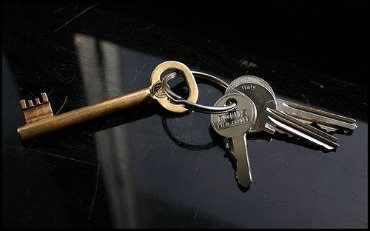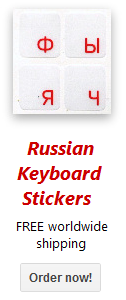 EN EN |
Qui sommes-nous? | Accueil | Accord de l'utilisateur | Lien vers notre site |
Vocabulaire Russe (et Bon Sens)
Ce mot russe est l'un des 1000 premiers mots en russe. La liste complète des mots russes les plus courants est disponible ici.
Signification: to leave, forget, give up
Prononciation: [ahs-TAH-veet']
Nature du mot: verbe (perfective aspect)
Rang: #398 (voir la liste de fréquence)

I left my keys at home.
Photo by jakeliefer CC-BY-2.0
- Я оста́вил ключи́ до́ма.
- I left my keys at home.
- Сла́ва оста́вил маши́ну на углу́.
- Slava parked his car at the corner.
- Littéralement Slava left the car at the corner.
- Оста́вь мне свой телефо́н.
- Give me your phone number.
- Littéralement Leave me your phone number.
- Ты оста́вил во́ду соба́ке?
- Have you left water for the dog?
- Оста́вьте меня́ в поко́е!
- Leave me in peace! (plural "you")
- Она́ оста́вила цвето́к на па́мять.
- She kept the flower as a souvenir.
- Littéralement She left the flower on memory.
- Предста́вь себе́: мне нé с кем оста́вить дете́й!
- Imagine, I don't have anybody to leave the childen with.
- Дя́дя оста́вил мне огро́мное состоя́ние.
- My uncle left me a huge fortune.
- Как ты мог оста́вить утю́г включённым?
- How could you leave the iron plugged in?
- Ах, оста́вьте! Фильм был действи́тельно ужа́сный!
- Oh, it's no more discussable! The film was really horrendous!
- Littéralement Oh, leave! The film was really horrible.
- Меня́ оста́вили на второ́й год и́з-за матема́тики.
- They made me repeat a year of study because of maths.
- Littéralement They made me remain a second year because of math.
- Си́лы оста́вили ра́неного.
- The wounded fainted.
- Littéralement Strengths left the wounded.

- оста́вить вопро́с откры́тым = leave the question open
- оста́вить в поко́е = leave in peace, leave alone
- оста́вить за собо́й пра́во = reserve the right
- оста́вь! = stop that!
Littéralement leave! - ка́мня на ка́мне не оста́вить = raze to the ground
Littéralement not to leave stone on stone - оста́вить с но́сом = trick
Littéralement leave with me nose - оста́вить на па́мять = keep as a souvenir
Littéralement leave on memory - оста́вить насле́дство = leave a fortune
- оста́вить в живы́х = leave alive
- оста́вить му́жа = leave a husband
- оста́вить без внима́ния = ignore
Littéralement leave without attention - оста́вить на произво́л су́дьбы = leave to the mercy of fate
- оставля́ть = leave, forget
- забы́ть = forget
- Пожале́л волк кобы́лу, оста́вил хвост да гри́ву.
- The person turned out to be really cruel.
- Littéralement The wolf felt pity for the horse, he left the tale and the mane.
Le Présent
Le verbe perfectif оставить n'est pas utilisé au Présent. Utilisez plutôt le verbe imperfectif оставлять.
Le Passé
| Je, tu, il | оста́вил |
| elle | оста́вила |
| Il (neutre) | оста́вило |
| nous, vous, Ils/elles | оста́вили |
Le Futur Simple
| Je | оста́влю |
| Tu | оста́вишь |
| il, elle, (neutre) | оста́вит |
| nous | оста́вим |
| vous | оста́вите |
| Ils/elles | оста́вят |
Le Futur Composé
Le verbe perfectif оставить n'est pas utilisé au Futur Composé. Utilisez plutôt le verbe imperfectif оставлять.
Mode Impératif
| Tu | оста́вь |
| Vous | оста́вьте |
Voir la table de conjugaison complète pour la paire du verbe оставлять/оставить
Vocabulary lesson: By Russificate blog exclusively for MasterRussian
Enregistrements de phrase: Copyright(c) 2011 MasterRussian.com. Tous droits réservés.Enregistrements de mots: Copyright(c) 2006 Streit Goulnara, Streit Eric, Vion Nicolas. Copyright(c) 2007 S. Sakhno, N. Vion. Distribué sous CC-BY.
Copyright 2001-2024 MasterRussian.com | Accord de l'utilisateu | Nous Contacter
 Cours de Russe
Cours de Russe
- Alphabet russe
- Lettres de l'Alphabet
- Prononciation: Cons.
- Prononciation: Voyelles
- Genre/Nombre des Noms
- Cas des Noms Russes
- Salutations en Russe
- Pronoms Personnels
- Apprendre le Russe
- 1000 Mots Courants
- 500 Verbes Russes
- Top Noms Russes
- » Toutes les leçons
 Parcourir les Sujets
Parcourir les Sujets
- Forum
- Dictionnaires
- Russe - Basique
- Prononciation
- Lecture
- Traduction
- Verbes
- Nombres Russes
- Vocabulaire
- Exp. Écrite
- Musique Russe
- Léon Tolstoï
- Connaissance de l'Apprenant
- Littérature
- Proverbes
- Publications
- Radio & TV
- Culture Russe
- Mots Russes
- Noms Russes
- Mots russes iPhone
Cliquer sur le bouton "J'aime" au-dessous pour devenir notre fan sur Facebook et obtenir nos mises à jour quotidiennes!

Recherche MasterRussian

Comme MasterRussian sur Facebook

Apprendre les mots russes »


